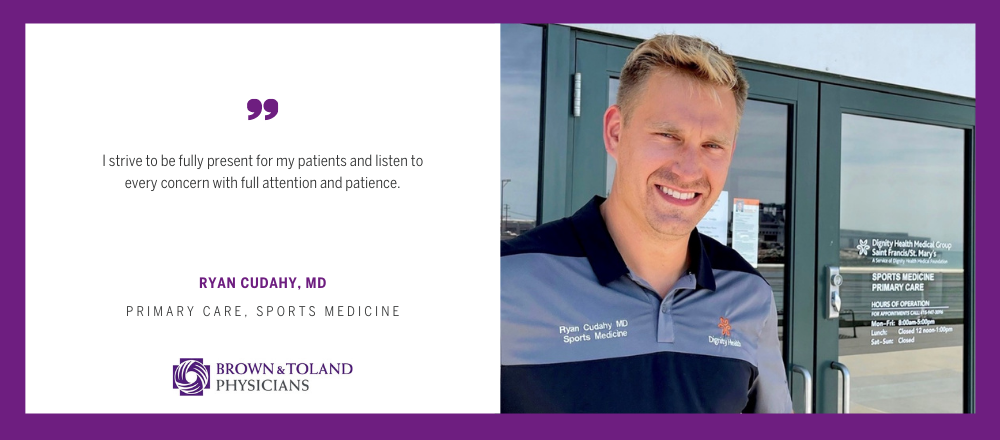Sports Medicine: A Q&A with Dr. Ryan Cudahy

You don’t have to be a high-level athlete to see a primary care sports medicine physician.
In this Q&A, Brown & Toland physician Ryan Cudahy, MD, explains how he helps his patients, from “weekend warriors” to the pros, to anyone suffering from a musculoskeletal condition.
What is “sports medicine”? Does a patient need to be involved in athletics to see you?
In general, sports medicine can refer to the management of any musculoskeletal injury. This may be acute, such as a recent tendon or ligament strain, or chronic like an overuse injury due to poor posture or compensation for a relative weakness. These ailments may affect anyone, and therefore a sports medicine physician’s management strategies and techniques may also apply to anyone. In fact, some of the most common patient visits are from the “weekend warriors,” recreational athletes and older patients suffering from arthritic joints.
What do you like to do when you’re not treating patients?
Honestly, I play sports. I played three varsity sports in high school including basketball, football, and soccer and then ended up playing rugby throughout college. I was the athletics club president for my medical school and the activities director at the Mayo Clinic during residency, as well. Basically my entire life has revolved around my ability to play and compete. Here in San Francisco, I enjoy flag football, softball, kickball and basketball, of course. I also recently picked up golf (finally!) during the COVID pandemic and am definitely hooked!
Did your passion for athletics inform your decision to become a sports medicine specialist?
Absolutely! I am a big proponent of the belief that if you love what you do, you never have to work a day in your life. So, I figured if I was able to turn my passions into a career, one in which I can surround myself with like-minded individuals and provide a service to this community, I could not go wrong.
What is your approach to patient care?
I believe in a patient-centered and tailored approach to every injury, ailment and individual because no two patient presentations are the same. Provider timeliness is something I take great pride in and I can guarantee that when a patient is in my clinic and ready to be seen, I will be present in the patient room. I do not take away from patient time to write notes or complete ancillary tasks. I strive to be fully present for my patients in this way and listen to every concern with full attention and patience.
How do you diagnose and treat sports medicine patients virtually?
I have to admit this is not ideal. Sports medicine is a physical practice and a lot of my expertise and utility for the patient comes from being able to diagnose and determine management strategies based on a physical examination and, in some cases, an ultrasound evaluation. That being said, the capacity for virtual examination and history taking has come a long way even since the beginning of my career and the Zoom platform has been instrumental in our ability to care for patients during the pandemic.
How can patients, particularly “weekend warriors,” prevent injuries?
In the most basic sense, the prevention of injuries can be looked at with three basic principles. First, there is the pre-workout or pregame routine that not only should include warming up and stretching but also ensuring proper equipment, fit, and knowledge of the sport or activity. Second, there is the in-game or during-activity phase in which an athlete needs to be able to listen to their body and respond to any particular strain, cramping, or pain without pushing to the point of injury. Finally, there is the cooldown or post-game routine in which the focus is a tapered level of activity, stretching, and managing any significant inflammation with RICE (Rest, Ice, Compression, and Elevation).

MEDICAL DISCLAIMER: The content of this Website or Blog is not intended to be a substitute for professional medical advice, diagnosis, or treatment. Always seek the advice of your physician or other qualified health provider with any questions you may have regarding a medical condition. Never disregard professional medical advice or delay in seeking it because of something you have read on this Website or Blog.
If you think you may have a medical emergency, call 911 immediately, call your doctor, or go to the emergency room/urgent care.
